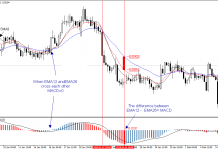„Searching, Analysing, Trading” is a series of analyses designed for an investment strategy based on Price Action and Elliott Waves. Its step-by-step description can be found in this link. We kindly invite you to follow our today’s review of selected currency pairs and potential opportunities for transactions.
Our analyses are prepared based on Ducascopy’s SWFX Sentiment Index, available here.
EUR/USD
Yesterday, the EUR/USD pair reached a lower limit of the resistance zone. Initially that level was rejected and since that moment we have been observing declines. Looking at the wave sequence, the whole rise can be laid out as a three; however, wave 3C has not been completed yet. Sub-wave five is needed to that end, which should form following the completion of the correction and in the nearest future we will witness another attempt of an attack, this time against the upper limit of the supply zone. That move will end with an ABC correction or an impulse wave will start unfolding.
On the Ichimoku chart, we can see that the pair succeeded in breaking the Kijun D1 line, which may imply an attempt to continue gains. Having had a look at sentiment, on which since yesterday we have been witnessing a strong reduction of shorts and an increase in longs, I am waiting for a retest of the Kijun line and planning to look for an entry to trade sub-wave five.
GBP/USD
The pair keeps moving within an ascending channel. Yesterday we saw its attempt to attack the its upper limit, which ended in a failure. There are still two scenarios that can play out. The first assumes that the whole impulse down from the very top has been completed and the current gains are part of its correction. Based on that scenario, the rise we are observing may be wave A of that correction and the whole move should head towards the resistance zone marked on wave 4. The second scenario implies an extension of wave 5, which means that the rise taking place from the bottom is a correction of wave 5 – not of the whole impulse.
On the Ichimoku chart, we can see that the pair reached the Kijun D1 line and is trying to breach it. If successful, we can assume that the first scenario plays out and we can look for an entry to trade wave 3C. If the gains we have been observing, get corrected to the Tenkan D1 or the pair goes higher and retests Kijun D1, we could start looking for positions. A strong rejection of Kijun and a fall underneath Tenkan D1, will trigger off the second scenario.
The partner of “Search, Analyse, Trade” series is a Dukascopy Europe broker who gives its customers access to ECN accounts in different currencies.
Trade on Forex, indices and commodities thanks to Swiss FX & CFD Marketplace. Open free trading account right now.
USD/JPY
On the USD/JPY pair, we can see a completion of an impulse up, in which wave 5 was an expanding triangle. The decline we are now observing should be its correction, after whose completion we should see resumption of moves up (assuming the impulse that was formed is not wave C of an irregular correction). The correction should reach the area of wave 4 or slightly lower – where the support line is situated.
On the Ichimoku chart, we can see that the pair went above the Kijun D1 line and currently we are observing its retest from the top. Also, the Senkou Span B line is being tested and is giving a boost to that level. We can already start looking for positions to trade wave 3C -favoured by sentiment, where we can see a strong fall in shorts and a rise in longs. However, if the pair does not sustain its current levels and goes below Kijun D1, its next destination should be the Tenkan D1 line.
Translation: Mirosław Wilk




















![Reltex Group Reviews: Explore business opportunities by Trading [reltexg.com]](https://comparic.com/wp-content/uploads/2023/12/image001-218x150.jpg)
![Mayrsson TG Reviews: Why Choose Crypto-Trading with Them? [mayrssontg.com]](https://comparic.com/wp-content/uploads/2023/12/image1-218x150.jpg)






